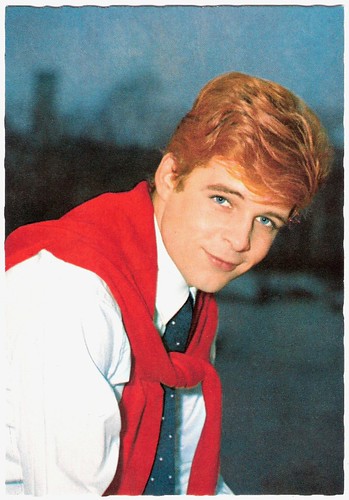
German postcard by ISV, no. K 26. Photo: Erwin Schneider.
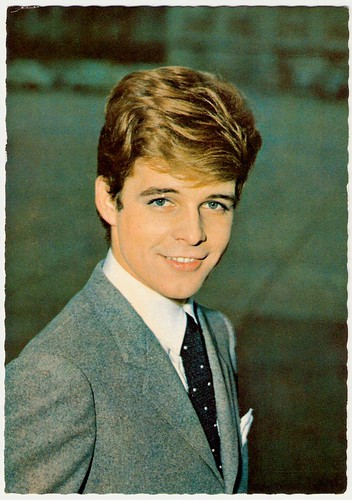
German postcard by ISV, no. K 27. Photo: Erwin Schneider.
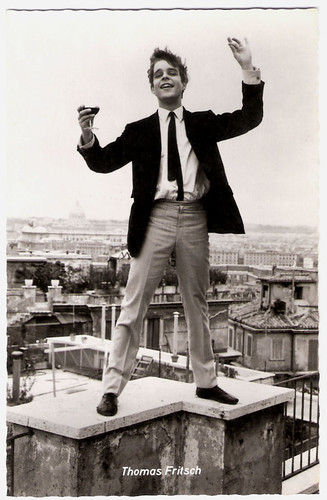
German postcard by Kolibri, no. 2007.

German Kolibri postcard by Friedrich W. Sander-Verlag, Minden/Westf., no. 2650. Photo: Lothar Winkler.
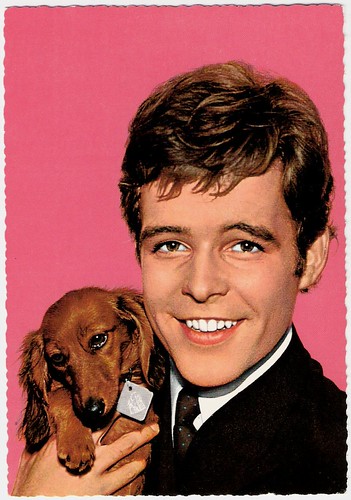
German postcard by Krüger, no. 902/371. Photo: Polygram / Yüksel.
I learned it from father
Thomas Fritsch was born in Dresden, Germany in 1944. He was the son of the legendary Ufa star Willy Fritsch and the dancer and actress Dinah Grace (aka Ilse Schmidt). He had a brother, Michael.
When the war ended, the family fled to Hamburg. Actor and director Gustaf Gründgens advised 16-year-old Thomas to become an actor. So after high school, Fritsch studied with Eduard Marks, the head of the drama class of the Hochschule für Musik und Theater (University of Music and Theatre) in Hamburg. He also took singing and ballet lessons.
In 1960 he was discovered for the screen and made his debut in Das gibt's doch zweimal/That Can Be Done Twice (1960) with Gus Backus and his father Willy Fritsch. He played the son of Lilli Palmer in the Austrian comedy Julia, Du bist zauberhaft/Adorable Julia (Alfred Weidenmann, 1962), which was entered into the 1962 Cannes Film Festival.
Other well-known films are Das schwarz-weiß-rote Himmelbett/Black-White-Red Four Poster (Rolf Thiele, 1962) with Daliah Lavi, and Das große Liebesspiel/And So to Bed (Alfred Weidenmann, 1963) with Lilli Palmer. Thomas was also the singer of Schlagers as 'Dreamy Girl'. The teen idol appeared on many covers of the popular German youth magazine Bravo. Weekly, he received 2,000 letters from his mostly female fans.
Together with his famous father, he co-starred in Das hab ich von Papa gelernt/I Learned It from Father (Axel von Ambesser, 1964). But in the following years, his film career went downhill and the dream of a Hollywood career became a deception.

German postcard by Filmbilder-Vertrieb Ernst Freihoff, Essen, no. 841. Photo: Lothar Winkler.
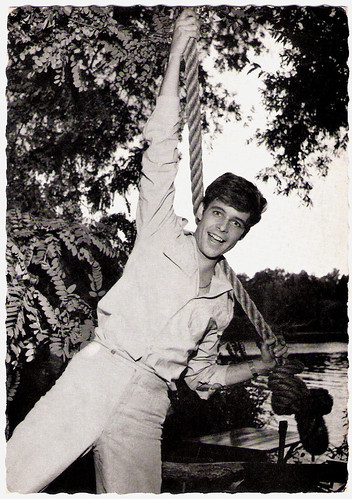
German postcard by Filmbilder-Vertrieb Ernst Freihoff, Essen, no. 842. Photo: Lothar Winkler.

German postcard by Filmbilder-Vertrieb Ernst Freihoff, Essen, no. 843. Photo: Lothar Winkler.

German postcard by Filmbilder-Vertrieb Ernst Freihoff, Essen, no. 850. Photo: Lothar Winkler.

German postcard by Filmbilder-Vertrieb Ernst Freihoff, Essen, no. 889. Photo: Lothar Winkler. Thomas Fritsch and his father, Willy Fritsch.
The voice of Scar
After his days as a teen idol were over, Thomas Fritsch focused on a stage career. In 1964, he already had made his stage debut in G.B. Shaw's 'Candida' at the Stadttheater Heidelberg. In 1965, the Frankfurter Kleinen Theater am Zoo engaged him and later followed engagements at other stage companies in Munich, Berlin, Stuttgart, and Hamburg.
On TV, he was seen in many series including episodes of popular Krimi series like Der Kommissar (1970-1975) and Derrick (1974-1989).
From the 1990s on, Fritsch was a busy voice actor, who dubbed many American actors for the German versions of their films. Among the films he gave his voice to are such blockbusters as The Three Musketeers (Stephen Herek, 1993), Die Hard with a Vengeance (John McTiernan, 1995), Titanic (James Cameron, 1997), Gladiator (Ridley Scott, 2000), Harry Potter and the Philosopher's Stone (Chris Columbus, 2001), Master and Commander: The Far Side of the World (Peter Weir, 2003), The Lord of the Rings: The Return of the King (Peter Jackson, 2003), Kingdom of Heaven (Ridley Scott, 2005) and The Dark Knight (Christopher Nolan, 2008).
One of his best-remembered dubs was the voice of Scar in the German version of The Lion King (Roger Allers, Rob Minkoff, 1994). Since then, he voiced many other animated animals in such hits as Ice Age (Chris Wedge, Carlos Saldanha, 2002), Finding Nemo (Andrew Stanton, Lee Unkrich, 2003), and Ice Age: The Meltdown (Carlos Saldanha, 2006). Fritsch also gave his voice to such hit series as The Nanny (1993–1999) and South Park (2003). He also could be seen in films like the Edgar Wallace satire Der Wixxer/The Trixxer (Tobi Baumann, 2004) as the Earl of Cockwood, and the fantasy Mara und der Feuerbringer/Mara and the Fire Bringer (Tommy Krappweis, 2014).
Thomas Fritsch lived in Munich, Germany, and on the Greek island of Mykonos. Most of the sources didn't have more information about Fritsch's private life than that he was an active animal rights activist and that he loved his mother. For those readers who might think his song 'Schau mich bi' had a deeper meaning: the confirmed bachelor denied in 1991 firmly he's gay. However, in 1996, Fritsch confessed he was bisexual. Thomas Fritsch died on 21 April 2021 at the age of 77, after having last lived in a retirement home.
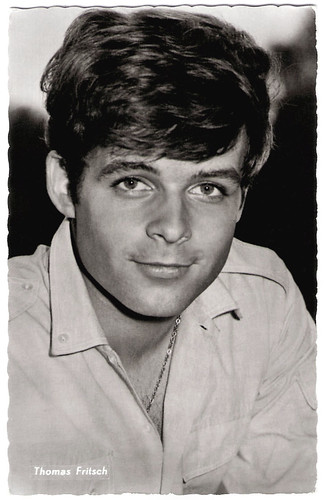
German postcard by Filmbilder-Vertrieb Ernst Freihoff, Essen, no. AX 5758. Photo: Lothar Winkler.

Small Romanian collectors card. Photo: Mario Adorf, Thomas Fritsch and Marisa Mell in Der letzte Ritt nach Santa Cruz/The Last Ride to Santa Cruz (Rolf Olsen, 1964).

German postcard by Kolibri-Verlag, Minden, no. 2040. Photo: Linda Christian and Thomas Fritsch in ...e la donna creò l'uomo/Full Hearts and Empty Pockets (Camillo Mastrocinque, 1964).

German Kolibri postcard by Friedrich W. Sander-Verlag, Minden/Westf., no. 2151. Photo: Stedthalle / Berolina / Kurt Ulrich / Nora. Thomas Fritsch in Das hab ich von Papa gelernt/I Learned It from Father (Axel von Ambesser, 1964).

German Kolibri postcard by Friedrich W. Sander-Verlag, Minden/Westf., no. 2344. Photo: Berneis / Nora. Bibi Jelinek and Thomas Fritsch in Onkel Toms Hütte/Uncle Tom's Cabin (Géza von Radványi, 1965).
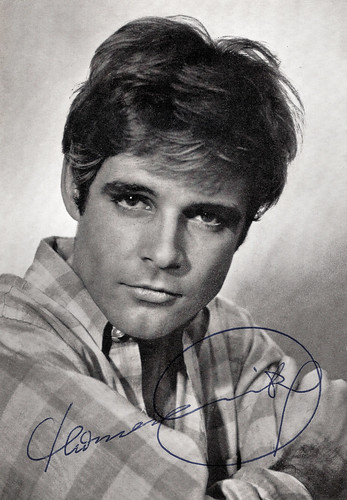
German German promotion card. Photo: Hans J. Hoffmann, Frankfurt.

German autograph card.
Sources: Stephanie D'heil (Steffi-Line - German), Wikipedia (German and English), and IMDb.
This post was last updated on 17 April 2024.
No comments:
Post a Comment